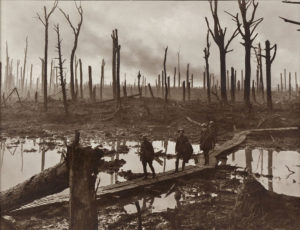The next letter from Private B. K Lesley is a month later with him still in France. It is dated December 16, 1917 and was published February 7, 1918 in the Kinsley Mercury. He has received a letter from his brother James asking him to describe France. His vivid description is still difficult to read today.
“You ask me to give you a description of the country. Would that I could comply. Since that September dawn when the gentle fingers of the morning breeze drew the clinging curtain of mist and revealed to our eager gaze the gold crowned hills of sunny France, I have seen sights which not only baffle description but hold the imagination enthralled to such an extent that the mind almost refuses to dwell upon common things.
According to ones spirits one is impressed. The winding lanes, the verdantly green slopes. The trim copse, the villages with their multi-colored houses and the red tile roofs at one time impress one, at another it is only the filth and squalor one notices; but at no time can one get away from the awful realization that the country is bleeding, bleeding from the millions of wounds, and that a terrible combat is close at hand.
To the south it is true the roar of the guns is lost in the distance, but the once peaceful villages are peaceable no more; always there are moving troops, moving transports and moving wounded, moving north and south. But the country retains its natural beauty, its hills and valleys, its brooks and streams, its woods and meadows playfully catch and reflect the passage of fleecy clouds across the azure sky as though war was the childish pastime of mortals but of no interest to them. A few kilometers north and we see the same moving troops, transports and wounded moving north and south and the sound of the guns become audible, faint at first but with gradual increasing force and destruction until, when quite close, it sounds as though some angry God was striking with all his might upon the major chord of some titanic instrument and the ruins caused by looming on in Tritgies (German for Strategies) early onward rush become more numerous. A few kilometers more and, thank god, you can’t see it. It is desolation grim and terrible, even nature has not been able to stand against it. For miles and miles, as far as the eye can reach there is nothing green, nothing living; trees, grass vegetation; all are gone. There is only mud and interlacing shell holes. The villages and farms which were, are only crumbled heaps of ruins, grim trophies of this awful game and always the disappearing army is moving, moving grandly, majestically, tragically to its predestined end. Moving north into the vortex of war’s awful caldron and the wounded are moving south.
Your Affectionate Brother, Ben
 Australian troops om the Ypres area, October 29, 1917
Australian troops om the Ypres area, October 29, 1917
